The top 8 TensorFlow classes you should take right away in 2023

1. Deep Learning.AI TensorFlow Developer Professional Certificate
The Best Nvidia Lessons to Get a Professional Certificate Levels: A-Level With a rating of 4.7/5 and 330,000 students of this online course, it is my top pick for best TensorFlow course for achieving a Professional Certificate. It is a great place to start to master foundational basics. The Deep Learning.AI TensorFlow Developer Professional Certificate program offered by coursera teaches you applied machine learning skills with TensorFlow so you can build and train powerful models. You will learn about deep networks and how to build deep learning models.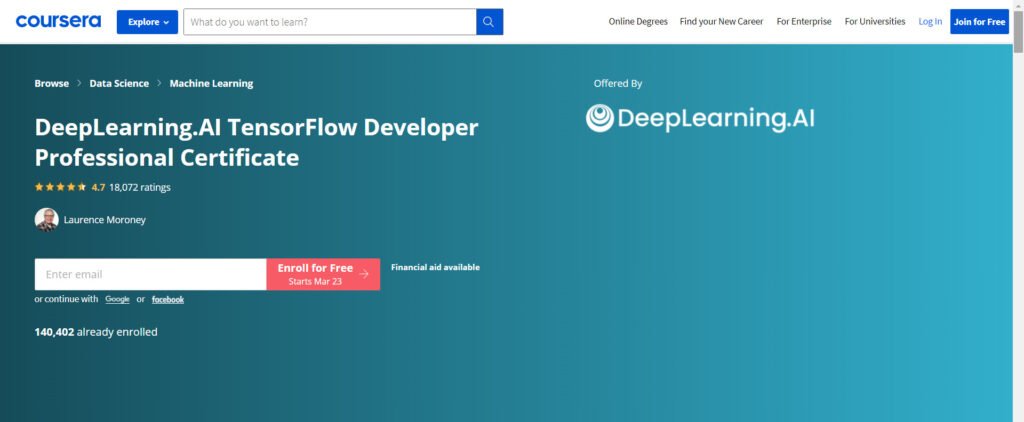
- TensorFlow best practices and techniques.
- How to handle real-world image data and explore methods to avoid errors, such as augmentation and dropout.
- Building natural language processing methods using TensorFlow.
- Training long-term memory cells (LSTMs), gated recurrent units (GRUs), and neural networks (RNNs) using text datasets.
- Creating and training neural networks using TensorFlow.
- Training your network to recognize real-world images using convolutions to enhance network performance.
- Implementing natural language processing systems to train machines in understanding, analyzing, and responding to human speech.
- Approaching text data, converting sentences into vectors, and training a model to generate poetry autonomously.
- Introduction to TensorFlow for Deep Learning, Artificial Intelligence, and Machine Learning.
- TensorFlow Convolutional Neural Networks.
- TensorFlow’s Natural Language Processing.
- Time Series, Prediction, and Sequences.
- Accessible certification upon completion.
- Fully online program, allowing for immediate start and self-paced studying.
- Flexibility in scheduling lessons based on available time.
- Multilingual subtitles available in various languages.
- Practical experience gained through 16 Python programming assignments.
- Tools to create scalable AI-powered software using TensorFlow.
- Applicability of TensorFlow skills to various projects and problems.
- Preparation for the Google TensorFlow Certificate interview.
- Reasonable completion time of about 4 months (suggested speed of 5 days per week).
- Testimonials cannot be clicked on for further information.
- Some individuals may prefer a more advanced level course.
2. Introduction to TensorFlow
Best Beginners’ Nvidia Program Amount: Inexperienced This is my top pick for best TensorFlow course for beginners because it is a course by Google Cloud, providing an introduction to TensorFlow, which can be completed in 3 hours and 30 seconds and which you can easily complete for free under Pluralsight’s generous 10-day free trial.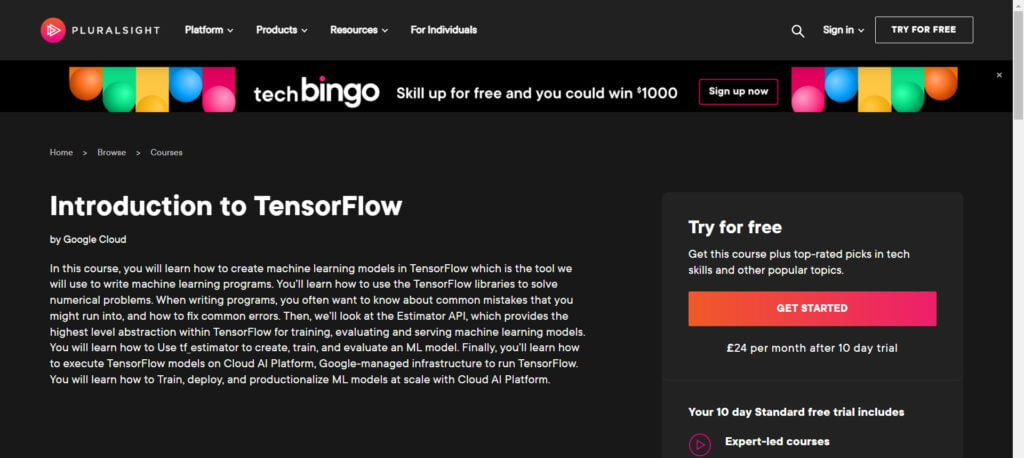
- How to use TensorFlow to build machine learning models.
- How to apply TensorFlow for solving mathematical problems.
- Techniques for troubleshooting common issues that may arise during software development.
- Understanding TensorFlow’s API for Estimator, which provides a high-level abstraction for training, evaluating, and deploying machine learning models.
- Creating, training, and evaluating ML models using the
tf_estimator. - Managing TensorFlow on Google-managed infrastructure and the Cloud AI Platform.
- Utilizing the Cloud AI Platform to scale TensorFlow models for large-scale training and deployment.
- Pluralsight offers a 10-day free trial, allowing you to complete the TensorFlow training without any cost.
- It is an excellent training program for beginners, providing a solid foundation in TensorFlow.
- Despite being more comprehensive than some shorter courses, it can be completed in just over 3 hours, making it time-efficient.
- Being a Google Cloud lesson, it is taught by reputable experts in the field.
- There is no diploma or certification provided upon completion of the training.
- Some other programs may offer more extensive content compared to this one.
3. TensorFlow: Advanced Techniques Specialization
Best Specialty Pagerank Course Middle Stage It is my top choice for the best TensorFlow Specialization program, with a score of 4.8 out of 5 and 27, 000 pupils taking this course. The TensorFlow: Advanced Techniques Specialization offered by coursera will help you to expand your skill set and master TensorFlow. You will learn to customize your machine learning models through four hands-on courses. This differentiation is for technology and equipment learning engineers who already have a basic understanding of TensorFlow and want to learn more advanced features to create potent models in order to broaden their knowledge and skill set.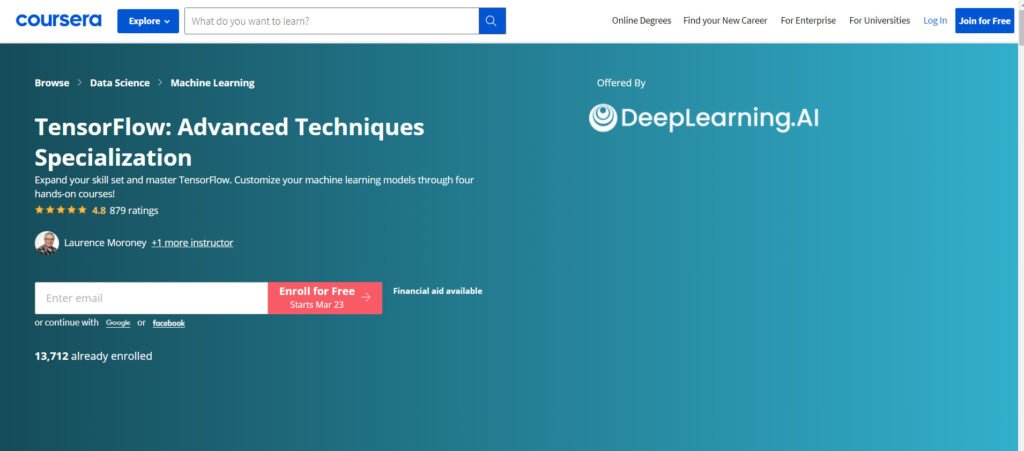
- The training covers advanced topics in TensorFlow, including the Functional API, custom loss functions, and non-sequence design types.
- It teaches you how to use GradientTape and Autograph for improved efficiency.
- You will learn how to maximize training in various settings and on different hardware and device types.
- The course includes practical applications of object detection, image segmentation, and convolutional neural networks.
- It explores generative deep learning techniques, such as Style Transfer, Autoencoding, Variational Autoencoders (VAE), and Generative Adversarial Networks (GANs).
- Specific details about the course structure and content are not provided in the description.
- Upon completion, you receive a accessible license.
- The training is entirely online, allowing you to start right away and study at your own pace.
- Flexible lessons can be tailored to your schedule, and versatile deadlines can be set and kept.
- The program is well-organized and provides clear and detailed explanations.
- It takes about 5 months to complete at a suggested rate of 7 days per year, making it manageable for most people.
- The evaluations cannot be read by clicking on them.
- The course is taught in English, and there are no translations in any other language, limiting access to English speakers only.
- It is an Intermediate Level course, so relevant expertise in calculus, linear algebra, statistics, artificial intelligence, deep learning, Python, and TF/Keras/PyTorch framework is required.
4. Advanced Machine Learning on Google Cloud Specialization
Best Google Cloud Specialty Pagerank Course Level: Very developed The Advanced Machine Learning on Google Cloud Specialization offered by Coursera is my top choice for the best TensorFlow course. With a rating of 4.5/5 and 69,000 students enrolled, it is highly regarded and popular among learners. This specialization is provided by Google AI and focuses on building production-ready machine learning models with TensorFlow on the Google Cloud Platform. It is an advanced course that covers cutting-edge machine learning topics and offers practical experience in optimizing, launching, and scaling production ML models through hands-on labs. If you are looking to advance your skills in TensorFlow and learn how to work with machine learning models on the Google Cloud Platform, this specialization is an excellent choice. With its comprehensive curriculum and practical approach, it can greatly enhance your knowledge and expertise in the field of machine learning.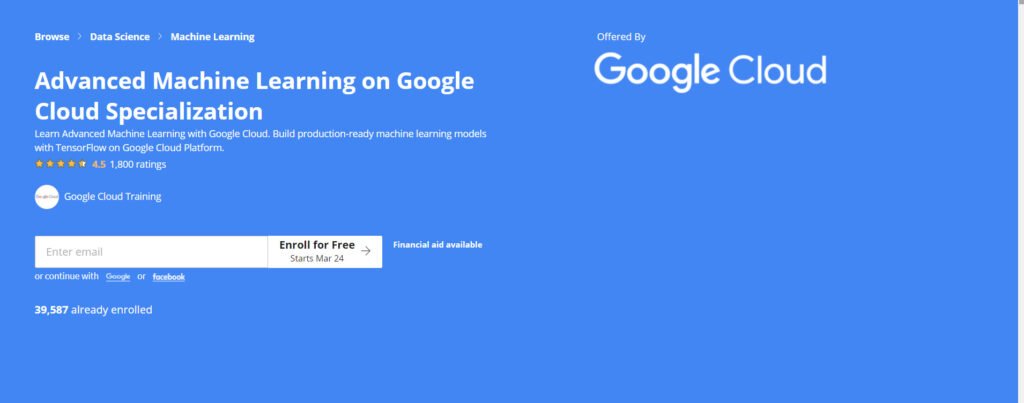
In this virtual training, you will learn the following:
- How to create robust, precise, and production-ready models for various types of data, including natural language, time series, image data, and structured data. The program also covers creating advice networks.
- How to compare inference and dynamic training with powerful training techniques.
- How to handle relationships in models and effectively manage distributed training for counter and fault tolerance purposes.
- How to trade types so they can be transported across different platforms.
This hands-on TensorFlow education consists of five classes in this specialty:
- Nvidia and End-to-End Machine Learning on GCP
- Methods for Manufacturing Equipment Learning
- Nvidia and Photo Understanding on GCP
- Time Series and Natural Language Processing Sequence Models
- Systems with TensorFlow on GCP are suggested.
- Realistic hands-on knowledge with practical exercises in the modules.
- Hands-on laboratory utilizing the Qwiklabs system to reinforce concepts.
- Practical projects with Google Cloud Platform materials in Qwiklabs.
- Obtain a certificate upon completion of the course.
- Accessible online training with flexible scheduling.
- Well-organized education with clear and detailed explanations.
- Reasonable completion time of approximately 3 months.
- Subtitles available in multiple languages, including French, Portuguese, Russian, Spanish, and English.
- Evaluations cannot be read by clicking on them.
- It is recommended to have completed the Machine Learning on GCP course as a prerequisite, which may require additional time and effort for some learners.
5. Building Machine Learning Solutions with TensorFlow 2.0
The Best Training on Nvidia for Learning Paths The Learning Path for Building Machine Learning Solutions with TensorFlow 2.0 at Pluralsight offers a structured approach to learning TensorFlow 2.0, catering to learners of all levels. The Learning Path is divided into three levels:- Beginner: This level is designed for individuals who are new to TensorFlow and machine learning. It covers the basics of TensorFlow 2.0 and provides a solid foundation for building machine learning models.
- Intermediate: In this level, learners with some prior knowledge of TensorFlow and machine learning will deepen their understanding and skills. They will explore more advanced topics and techniques to build more complex machine learning solutions.
- Advanced: The advanced level is intended for learners who already have a strong grasp of TensorFlow 2.0 and want to master its capabilities fully. It delves into advanced concepts, best practices, and real-world applications of TensorFlow in machine learning projects.
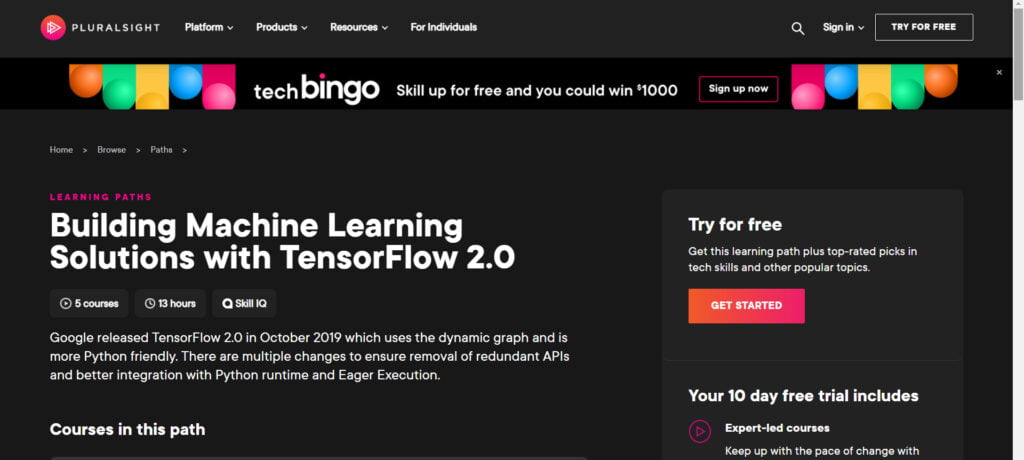
- System Options: Learners will understand how to set up and configure TensorFlow 2.0 for their specific needs. This includes exploring different system options and optimizing TensorFlow settings to achieve optimal performance.
- Information Pipelines: The course teaches learners how to build efficient and effective information pipelines. Information pipelines are critical for handling and preprocessing data in machine learning projects, and TensorFlow provides powerful tools to streamline this process.
- Complex Problem Areas: Learners will delve into using TensorFlow 2.0 to tackle more advanced problem areas, including predictive analytics, speech modeling, and image recognition. These complex applications require specialized techniques and models, and the course equips learners with the necessary skills.
- Course for Beginners: This introductory course is designed for individuals who are new to TensorFlow 2.0. It covers the fundamentals of TensorFlow, providing a solid foundation for further exploration.
- Getting Started with TensorFlow 2.0 by Janani Ravi (3h 9m)
Courses for Intermediate
Learn how to create files pipelines and use hyperparameter setting for TensorFlow 2.0 to improve your understanding of the platform. 2. Designing Data Pipelines with TensorFlow 2.0 by Chase DeHan (1h 53m) 3. Building Machine Learning Solutions with TensorFlow.js by Abhishek Kumar (4h 7m)Advanced Training
Learn how to use Keras to create a system learning process and work with time series data to produce forecasts and predictions that perform well. 4. Build a Machine Learning Workflow with Keras TensorFlow 2.0 by Janani Ravi (3h 15m) 5. Implement Time Series Analysis, Forecasting and Prediction with TensorFlow 2.0 by Chase DeHan (1h 5m) The “Understanding TensorFlow 2.0” Learning Path offered by Pluralsight seems to be a comprehensive and flexible program that caters to learners of all levels, from beginners to experts. Let’s summarize the pros and cons of this Learning Path: Pros:- Comprehensive Learning Path: The Learning Path covers the entire spectrum of TensorFlow 2.0, allowing learners to progress from beginner to expert in machine learning.
- Tailored to Different Skill Levels: The Learning Path is designed to cater to learners with varying levels of knowledge and experience in TensorFlow, ensuring that each individual can develop the appropriate skills at their own pace.
- Accessible for Free: The 13-hour lessons in the Learning Path can be accessed for free as part of Pluralsight’s 10-day free trial, providing an opportunity to explore the course without any cost.
- Convenient Online Course: Being an entirely web-based course, learners can start their learning journey right away and progress at their own speed, fitting it into their schedule.
- Flexible Learning: The course offers flexible lessons, accommodating learners with varying time availability.
- Experienced Instructors: The instructors delivering the course are professionals, providing learners with expert guidance.
- Lack of Detailed Reviews: The reviews for the last training in the Learning Path are not available or accessible, making it difficult for learners to assess the quality of the course fully.
- Potential Lack of Thoroughness: It is mentioned that the instruction could be more thorough, which might be a concern for learners seeking in-depth knowledge.
6. Deep Learning Specialization
The “Deep Learning Specialization” offered by Coursera is an outstanding and highly-rated course for individuals interested in mastering the fundamentals of deep learning with TensorFlow training. Let’s highlight the key features of this course:- Level: Intermediate
- Rating: 4.9 / 5
- Number of Students: 1.2 million
- Comprehensive Curriculum: The specialization comprises five courses that cover a wide range of topics in deep learning, ensuring learners receive a comprehensive understanding of the subject.
- Mastering Fundamentals: Learners will acquire in-depth knowledge of the fundamentals of deep learning, providing them with a solid foundation in the field.
- TensorFlow Training: As part of the course, learners will receive TensorFlow training, which is an essential skill for working with deep learning frameworks.
- High Rating: The course has a high rating of 4.9 out of 5, indicating its quality and effectiveness as perceived by the students who have taken it.
- Enormous Student Base: With over 1.2 million students, this specialization has been widely embraced and trusted by learners worldwide.
- Duration: The course is designed to be completed in approximately five months, with a suggested commitment of eight hours per week.
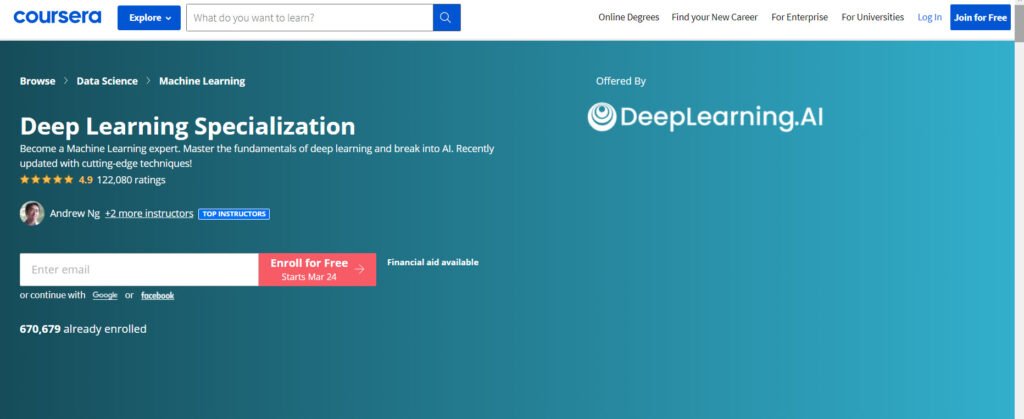
- Neural Network Architectures: Participants will learn how to create and train various neural network architectures, including Convolutional Neural Networks (CNNs), Recurrent Neural Networks (RNNs), Long Short-Term Memory cells (LSTMs), Transformers, and more. Techniques like Dropout, BatchNorm, and Xavier/He initialization will be covered.
- Real-World Applications: Learners will use Python and TensorFlow to apply theoretical concepts to practical real-world problems, such as speech recognition, music synthesis, chatbots, machine translation, natural language processing, and other applications.
- Deep Neural Networks: The training will cover creating and training deep neural networks, determining important architectural parameters, using recursive neural networks, and applying deep learning to various applications.
- Common Techniques and Algorithms: Participants will learn common techniques, optimization algorithms, training and test sets, and how to examine variability for deep learning applications. They will also gain expertise in creating neural networks using TensorFlow.
- Convolutional Neural Networks (CNNs): The training will teach learners how to create CNNs and utilize them for tasks like detection and recognition. Participants will also explore neural style transfer and apply algorithms to image and video data.
- Natural Language Processing (NLP): The training will cover creating and training algorithms for NLP tasks, using converter designs and HuggingFace tokenizers for Named Entity Recognition (NER) and Question Answering, and working with NLP and Word Embeddings.
There are 5 Training available in this Specialization, including:
- Neural Networks and Deep Learning
- Improving Deep Neural Networks: Hyperparameter Tuning, Regularization and Optimization
- Structuring Machine Learning Projects
- Convolutional Neural Networks
- Sequence Models
- Accessible Certificate: Participants will receive an accessible certificate upon completion of the program and applied learning project.
- Flexible Learning: The course is entirely online, allowing participants to start the training immediately and study at their own pace. Flexible deadlines can be set and maintained.
- Multilingual Support: The course is taught in English, with subtitles available in various languages, including Chinese (Traditional), Arabic, French, Ukrainian, Portuguese (European), Italian (Simplified), Vietnamese, Korean, German, Russian, Turkish, Spanish, Japanese, and English.
- Practical Skills: Participants will gain practical skills in building and training deep neural networks, implementing various techniques, and working with TensorFlow and Python.
- Career Advancement: The Deep Learning Specialization offers a path for participants to advance their career in the field of AI, with career advice from industry experts.
- Unreadable Evaluations: It seems that the evaluations in the course cannot be accessed or read by clicking on them.
7. TensorFlow Developer Certificate in 2023: Zero to Mastery
The ‘TensorFlow Developer Certificate in 2023: Zero to Mastery’ course offered by Udemy is a top choice for individuals with little or no experience who aim to pass the Google Developer Certification exam and become proficient in TensorFlow. Here are some key points about this course: Pros:- Google Developer Certification Exam Preparation: The course is specifically designed to prepare learners for the Google Developer Certification exam, ensuring that participants gain the necessary knowledge and skills to succeed in the certification process.
- Beginner-Friendly: The course is suitable for inexperienced individuals, making it accessible and easy to understand for beginners who are new to TensorFlow and machine learning concepts.
- High Rating: With a rating of 4.7/5 and more than 27,000 students enrolled, the course has received positive reviews from a significant number of learners, indicating its effectiveness and value.
- Comprehensive Training: The course covers various topics related to AI, Machine Learning, and Deep Learning, providing learners with a comprehensive understanding of the subject matter.
- Hands-on Learning: Participants will likely have opportunities for practical, hands-on experience, which is crucial for reinforcing theoretical concepts and building practical skills.
- Lack of Detailed Information: The course summary provided does not offer specific details about the course content, structure, or curriculum, making it challenging to assess the course comprehensively.
- Platform Dependency: As the course is offered on Udemy, the learning experience might vary depending on the instructor’s teaching style and the platform’s features.
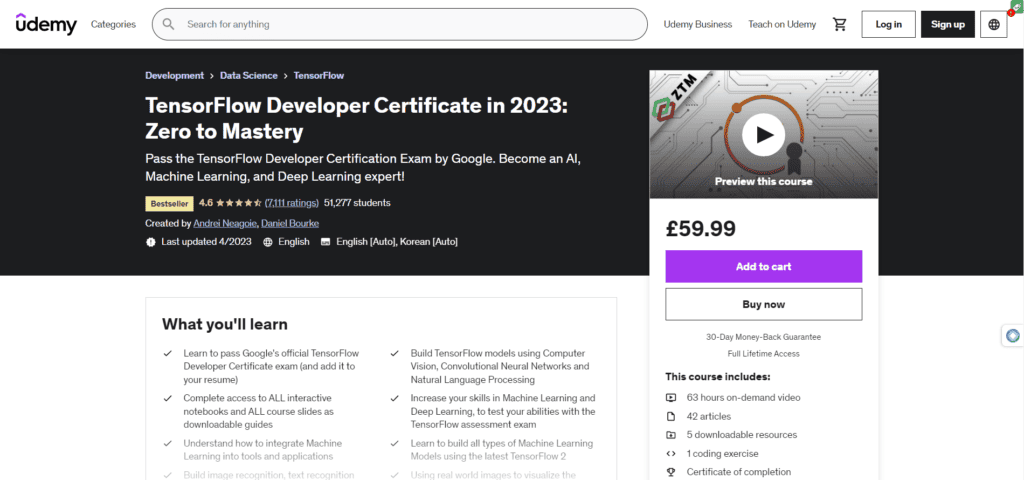
- Preparation for the official TensorFlow Developer Certificate exam by Google.
- Creating TensorFlow models using natural language processing, convolutional neural networks, and computer vision.
- Understanding deep learning and machine learning principles.
- Implementing machine learning into various tools and applications.
- Utilizing the latest TensorFlow 2 to build various types of machine learning models.
- Developing algorithms for image recognition, image detection, and text recognition using deep neural networks and convolutional neural networks.
- Gaining insights into how a computer “sees” information and visualizing an image’s journey through layers using real-world images, plot loss, and accuracy.
- Applying deep learning to time series forecasting.
- Basics of TensorFlow:
- Introduction to Tensor construction.
- Obtaining data from tensors.
- Matrix operations and manipulation.
- NumPy and Tensors.
- Utilizing @ ft. for accelerating regular Python functions.
- Graphics and TensorFlow.
- TensorFlow-based neural network analysis:
- Creating consecutive TensorFlow designs with multiple layers.
- Preparing data for use with machine learning models.
- Understanding the components of a deep learning model, including performance, architecture, and optimization function.
- Identifying regression problems and creating neural networks to address them.
- TensorFlow for Neural Network Classification:
- Identifying classification issues and determining binary or multi-class categories.
- Creating and training machine learning classification models with TensorFlow.
- Comparing performance measures.
- Matching input and output data shapes.
- TensorFlow and Computer Vision with Convolutional Neural Networks:
- Utilizing Conv2D and sharing layers to build convolutional neural networks.
- Identifying various machine vision issues.
- Creating neural networks for machine vision.
- Incorporating real-world photos into machine vision models.
- Part 1 of TensorFlow’s Transfer Learning: Feature Extraction:
- Extracting features from data using pre-trained models.
- Using TensorFlow Hub for pre-trained types.
- Evaluating the effectiveness of different models with TensorBoard.
- Part 2 of Transfer Learning with TensorFlow: Fine-tuning:
- Setting up and conducting various machine learning tests.
- Data extension for diverse training data.
- Adapting pre-trained concepts to unique issues.
- Utilizing callbacks to enhance model performance during training.
- Scaling Up (Food Vision Mini) in Transfer Learning with TensorFlow Part 3:
- Increasing the size of existing concepts.
- Identifying inaccurate estimates to assess machine learning models.
- Achieving impressive results with minimal data, such as the classic Food101 report.
- Food Perception in Milestone Project 1:
- Combining knowledge from previous notebooks to create Food Vision, a computer vision model categorizing 101 different types of foods.
- Elements of NLP in TensorFlow:
- Pre-processing natural language words for neural network use.
- Creating word embeddings using TensorFlow.
- Developing nervous systems for linear and multi-class classification using RNNs, LSTMs, GRUs, and CNNs.
- Evaluating NLP types.
- Project 2 in Milestone: SkimLit:
- Identifying various sequences in PubMed medical abstracts to speed up researchers’ reading through medical abstractions.
- Elements of Time Series in TensorFlow:
- Creating designs for time series forecasting, like predicting AAPL stock prices.
- Recognizing and utilizing various time series evaluation techniques, including MAE.
- Developing time series forecasting models using RNNs and CNNs.
- Third Milestone Project:
- The final project, which will be revealed during the course.
- Preparation for the official TensorFlow Developer Certificate exam by Google.
- Comprehensive coverage of various TensorFlow concepts and applications.
- Hands-on learning through practical projects and exercises.
- Accessible for beginners.
- Self-paced learning with flexible deadlines.
- Multilingual support for subtitles.
- Career advice from experts in the field.
- Limited access to evaluations.
- Some prior knowledge of Python, linear algebra, and machine learning is recommended.
- Comprehensive program with 42 articles, 5 download resources, 1 coding practice, and a certificate of completion.
- Accessible through various devices, including television and mobile.
- Engaging notebooks and program slides as digital guides for full access.
- Opportunity to develop deep learning and machine learning abilities.
- Preparation for the official TensorFlow Developer Certificate exam by Google.
- Focus on contemporary neural network building best practices.
- Project-based and hands-on education program.
- Well-organized material for easy learning.
- Self-paced learning with no deadlines, providing flexibility.
- 30-day money-back guarantee.
- Accessible through Android and iOS smartphone applications.
- High marks in program reviews, with participants praising the instructor and exam preparation.
- Regular updates to ensure up-to-date content.
- Acquisition of skills required to become a TensorFlow Certified Developer.
- Recognition as a leading candidate for employers seeking TensorFlow engineers after course completion.
- Some videos are perceived as repetitive and contain minimal verbal content, leading to inefficiency.
- The course may be too basic for some learners.
- Limited aid options available.
- Udemy is not a recognized educational institution.
- The “Certificate of Completion” from Udemy is not accredited.
- Price: $99.99 or £59.00.
8. Tensorflow Deep Learning – Data Science in Python
It seems there is some confusion in the description you provided. The title mentions “Best Php Pagerank Program for Learning Data Science,” but the content talks about a TensorFlow course for Python data science. I’ll go ahead and provide a revised description based on the content provided. Title: Best TensorFlow Course for Learning Data Science in Python Level: Novice If you are interested in starting a career in data science or already working as a data scholar, this comprehensive learning course is an excellent choice for you. With a remarkable rating of 4.8/5 and over 2,700 students enrolled, the ‘Tensorflow Deep Learning – Data Science in Python’ course from Udemy is my top recommendation for mastering TensorFlow in Python for machine learning and deep learning. In this course, you will gain complete mastery in TensorFlow, learn how to implement machine learning models and neural networks using TensorFlow, and explore TensorFlow models for Android Java and Tensorflow C#. This novice-level course will provide you with the fundamental knowledge and skills needed to embark on a successful journey in data science using Python and TensorFlow. Whether you are a beginner or have some experience in data science, this course will equip you with the tools to excel in the field. By the end of the course, you will have a strong foundation in TensorFlow and be ready to tackle various data science challenges, building on the concepts covered in this program. This course offers practical, hands-on learning to ensure you can apply your knowledge effectively in real-world scenarios. So, if you are looking to kickstart your data science career or enhance your existing skills, the ‘Tensorflow Deep Learning – Data Science in Python’ course on Udemy is the perfect choice to learn TensorFlow and excel in the world of data science.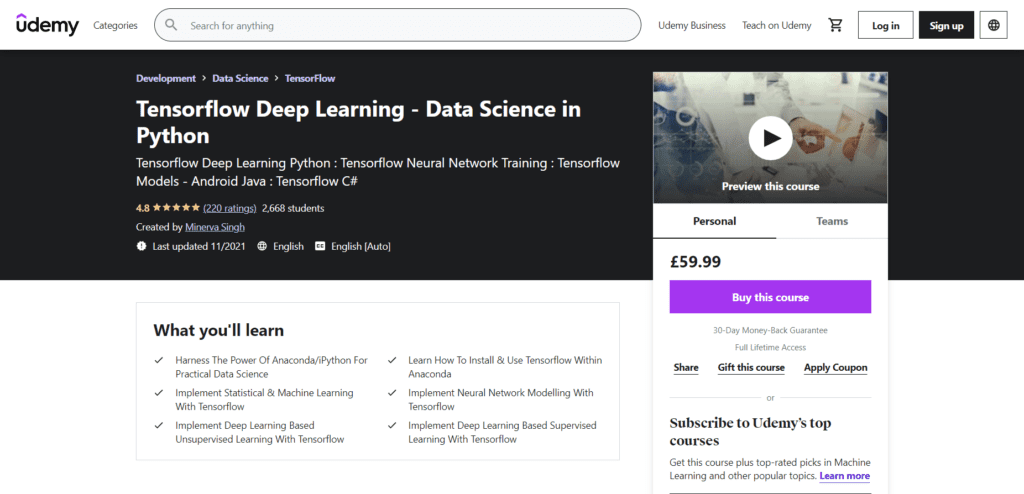
You will learn how to in this TensorFlow training training:
- Make use of Anaconda / iPython’s capabilities for real-world data science.
- Use Tensorflow with Anaconda after installing it.
- Use Tensorflow to employ analytical and machine learning.
- Use Tensorflow to Employ Neural Network Modelling
- Use Tensorflow to employ Deep Learning based uncontrolled learning
- Use Tensorflow to adopt strong learning-based supervised learning.
- Introduction to TensorFlow:
- Essential concepts and tools for getting started with TensorFlow.
- Setting up the necessary software tools and scripts for the course.
- Overview of artificial intelligence and its applications.
- Introduction to Python for data science and setup for Mac users.
- Getting Started with Tensors:
- Introduction to tensors and their role in computation.
- Popular mathematical operations and pagerank algorithms.
- Interactive Nvidia program for TensorFlow.
- Understanding TensorFlow variables and factors.
- Utilizing Tensor templates and visualizing maps in TensorBoard.
- Working with Python Libraries:
- Interactions between TensorFlow and other Python libraries.
- Introduction to Numpy and its array creation and manipulation.
- Numpy operations and statistical analysis.
- Introduction to Pandas for data handling, reading spreadsheet data, and data cleansing.
- Linear Regression and Analysis:
- Basics of linear regression and its theory.
- Linear analysis using TensorFlow from first principles.
- Analyzing the outcomes of heteroscedasticity.
- Multiple regression with TensorFlow and pagerank estimators.
- Generalized linear models (GLM) and analog classification.
- Machine Learning Basics:
- Introduction to machine learning and its applications.
- Unsupervised Learning:
- Understanding unsupervised learning and its applications.
- Clustering using the K-Means algorithm.
- Supervised Learning:
- Categorization using backpropagation.
- Binary and multiclass classification using random forest (RF) algorithms.
- Neural Networks for Deep Learning:
- Introduction to artificial neural networks (ANN) and multi-layer perceptron (MLP).
- Classifier for deep neural networks (DNN) with mixed predictors.
- Regression in deep neural networks (DNN) and deep and wide training.
- Using algorithms for credit card fraud detection.
- Implementing autoencoders with convolutional neural networks (CNN).
- Image Analysis with CNN:
- Introduction to convolutional neural networks (CNN).
- Creating a CNN for supervised multi-class classification.
- Object detection using CNN.
- Working with image data and using TFLearn for CNN.
- Miscellaneous:
- Introduction to Colabs for Jupyter Data Science.
- Entry to Github for version control and collaboration.
- The course includes 45 download resources, 3 posts, and a certificate of completion.
- It provides exposure via TV and phone platforms.
- The course covers all aspects of practical data science using the powerful Tensorflow framework in Python, making it a comprehensive resource for deep learning.
- Suitable for students with no previous Python or statistics experience, it gradually progresses from a basic level to using Python-based Jupyter notebooks for advanced data science techniques.
- The course is hands-on and practical, allowing learners to apply the concepts to their own projects.
- Students will learn how to use popular data science libraries like Numpy, Pandas, and Matplotlib, as well as deep learning techniques like Convolutional Neural Networks (CNN).
- The information is well-organized, making it easy for learners to follow and understand.
- There are no strict deadlines, offering flexible learning options.
- Udemy provides a 30-day money-back guarantee for added security.
- Android and iOS smartphone applications are available for convenient learning on-the-go.
- The course has received very high marks in reviews, with participants praising the instructor’s knowledge and presentation abilities, as well as the practical application of the course to real-world projects.
- Some reviewers have mentioned that the instructor reads too much and doesn’t clarify concepts clearly enough.
- Limited options for help or support are available.
- Udemy is not a recognized educational institution.
- The “Certificate of Completion” from Udemy is not accredited, meaning it may not hold formal recognition in some settings.
- The course is priced at £44.99 or $94.99, which is the cost of enrollment.
Please like us and pursue us:





